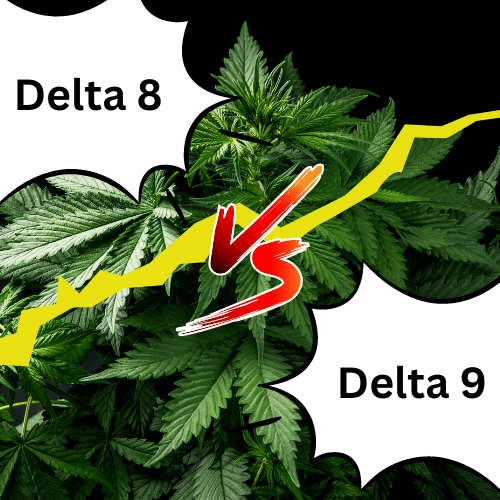What’s the Difference between Delta 8 and Delta 9 THC?

Delta 8 vs Delta 9 –
What’s the Difference?
Delta-8 THC is a naturally occurring cannabinoid in the cannabis plant that appears in nominal amounts. It is very similar to Delta-9 THC in molecular structure except for the position of its double bond. And like Delta-9 THC, Delta-8 THC is initially synthesized from CBG-A (Cannabigerolic Acid.)
When Delta-9 THC oxidizes, it is converted into CBN (cannabinol.) This is why aged cannabis is associated with higher levels of CBN. Delta-8 THC, on the other hand, is very stable and does not convert to another cannabinoid over time.

As far as the psychoactive similarities are concerned, Delta-8 THC is approximately 50% less potent than Delta-9 THC, the most prevalent cannabinoid in marijuana. This makes it a good alternative for first-time users of THC who are considering using marijuana to address their symptoms because it Delta-8 THC provides very similar medicinal benefits to marijuana without the paranoia often associated with beginners using Delta-9 THC for the first time, though this is not always the case.
From a legal standpoint, the 2018 Agricultural Improvement Act, more popularly known as the 2018 Farm Bill, made every compound in the hemp plant legal, except for Delta-9 THC, which has a legal permissible limit of 0.3% (three tenths of 1%.) This includes CBD, CBG, CBN, CBC and all the minor cannabinoids including Delta-8 THC. Delta-9 THC remains a Schedule I controlled substance and it is illegal unless you live in a state that has medical or recreation marijuana laws.
The legality of Delta-8 THC may change in the future. As of August 20, 2022, the DEA released the implementation of the Agriculture Improvement Act that would make all synthetically derived THC illegal and classify them as Schedule 1 substances, like Delta-9 THC.

Delta-8 THC can be obtained in several different form factors ranging from tinctures that are administered sublingually, to gummies, to infused drinks, to the most popular form, vape cartridges, but you need to be careful when purchasing these products because quality can vary drastically. Be sure that you obtain Delta-8 THC products from credible sources that have Certificates of Analysis (COAs) to ensure potency and purity.
Delta-8 THC is not a new cannabinoid, and it has been used in clinical settings before. In fact, it was isolated from cannabis sativa in the 1960s by Raphael Mechoulam, an organic chemist whom most consider to be the the “father of cannabis.” He used it in a study to treat children ages 3-13 with various hematologic cancers, and it proved to be a powerful anti-emetic as well as an analgesic, reducing pain associated with radiation and chemotherapy.
While more studies need to be conducted to validate the efficacy of Delta-8 THC, the products continue to be popular and in demand with people ranging from their 20s to their 70s.
Delta 8 THC
- Stable – it does not transform into another cannabinoid over time.
- It is legal to manufacture or purchase without a medical marijuana card. *Subject to change.
- 50% less potent than Delta-9 THC (marijuana.)
- Not approved by the FDA but legal to manufacture and purchase.
- Considered to be more like an Indica strain of cannabis which tends to relax the body and mind.
Delta 9 THC
- Unstable – when it oxidizes it converts to CBN.
- Schedule I controlled substance illegal to manufacture or purchase unless you are a licensed dispensary and you live in a state that has legalized marijuana on a medical or recreational level.
- 50% more potent than Delta-8 THC.
- Approved by the FDA for treatment of rare epilepsy disorders (i.e., Dravet Syndrome, Lennox-Gestaut.)
- Considered to be more cerebral and stimulating which tends to lift people up.

